SAN JOSE, Calif.—In 2010, Theranos Inc. was courting two major retailers, hoping to put its laboratory technology in busy pharmacies across the country.
The blood-testing startup won over Safeway Inc. and Walgreens Boots Alliance Inc. WBA -0.34% with the promise of real-time and cheaper lab testing, which would expand affordable healthcare for consumers and bring in more revenue to the retail giants, according to court testimony in the criminal trial of Theranos founder Elizabeth Holmes.
Testimony has shown how both chains’ executives were persuaded to believe in Theranos’s claims after years of due diligence, pilot projects, consultation with attorneys and medical experts and negotiations with the startup that would ultimately collapse.
What was missing from the diligence, according to court testimony over the past two days, is that neither company spent significant time studying the Theranos device itself and testing it for reliability or accuracy.
“Our common understanding was the technology worked as we were told,” former Walgreens Chief Financial Officer Wade Miquelon said in court testimony Wednesday.

Theranos Chief Executive Elizabeth Holmes, holding scissors, at a 2013 ceremony to mark the company’s partnership with Walgreens. At right are Walgreens’s former CEO Greg Wasson and former CFO Wade Miquelon.
Photo: Walgreens
Theranos said its proprietary technology could test for more than 200 health conditions using a few drops of blood from a finger prick. Reporting in 2015 and 2016 from The Wall Street Journal showed that Theranos’s blood-testing devices were unreliable and inaccurate, and the company could only perform a fraction of tests on its proprietary machines and relied on off-the-shelf commercial analyzers for the rest.
Attorneys for Ms. Holmes have said that running a failed company isn’t a crime and tried to place blame for any misrepresentations about Theranos’s technology and operations on her top deputy and ex-boyfriend, Ramesh “Sunny” Balwani.
Mr. Balwani faces the same dozen counts and has a separate trial slated for early next year. He has pleaded not guilty.
Mr. Miquelon, who helped oversee the early years of Walgreens’ ultimately tumultuous relationship with Theranos, testified Wednesday that the company did its own due diligence on Theranos, leaning in part on staff healthcare experts. Walgreens also hired a lab firm to provide an evaluation, and it told Walgreens that of the nearly 200 diagnostic companies Walgreens had considered working with, Theranos was “the farthest ahead,” Mr. Miquelon testified.
Walgreens turned to experts at Johns Hopkins University and asked doctors to meet with Ms. Holmes and Mr. Balwani. The doctors did, and determined that the technology was sound and would be useful in a retail clinic setting, according to a document shown in court. But they never got a Theranos device to “play with,” Mr. Miquelon said.
Former Safeway Chief Executive Steven Burd testified Tuesday that he also consulted with the laboratory directors at Johns Hopkins as well as the University of California, San Francisco, about Theranos’s claims. He invited one of the doctors to join him and Ms. Holmes for dinner to discuss Theranos’s business. Mr. Burd added that his contacts at Johns Hopkins had received a Theranos testing device, but the company took it back before the researchers could validate its functionality.
An email displayed in court from Mr. Burd showed that Safeway had completed hundreds of hours of due diligence on Theranos and communicated almost daily with Ms. Holmes for more than a year.
A board member from Safeway got his blood tested through a finger prick, although the machine malfunctioned and didn’t provide the results, Mr. Burd testified. Mr. Miquelon said he got his blood tested twice through finger pricks and got results some time later from his doctor.
Safeway and Walgreens each signed a deal with Theranos in 2010. Safeway ran a pilot program to test employees’ blood on its corporate campus. However, Theranos devices never ended up in Safeway stores, even though the grocer had spent more than $350 million building store clinics for that purpose.
The Walgreens project went through phases, from “Project Beta” in 2011, Mr. Miquelon said, to “Project Normandy” in 2012, as the companies hammered out the details. Mr. Miquelon said Walgreens and Theranos each sought the advice of outside experts on regulatory questions, such as whether Walgreens stores or Theranos’s headquarters would be considered the lab that needed to be regulated.
“Due to the new-to-the world nature of the technology, it required some work to understand,” Mr. Miquelon said in court testimony.
Both the Safeway and Walgreens agreements with Theranos gave the retailers an option to terminate the relationship.
Mr. Miquelon said Walgreens agreed to pay Theranos a $100 million “innovation fee” and $40 million for convertible notes, effectively a loan that gave the option to convert to an equity ownership stake in Theranos to help the startup meet the demands of the partnership.
Walgreens and Theranos launched in-store blood testing in 2013, starting with friends and family and then expanding to the public. Court records show Theranos’s relationship with Walgreens began deteriorating in 2014 after the startup missed key deadlines.
Later, Theranos would void tens of thousands of results from patients tested at Walgreens and stopped collecting blood through its signature finger-prick method under pressure from federal regulators. Walgreens sued Theranos for $140 million in 2016, and a year later they reached a confidential settlement that required Theranos to pay Walgreens more than $25 million, The Wall Street Journal reported at the time.
Write to Heather Somerville at [email protected]
Copyright ©2021 Dow Jones & Company, Inc. All Rights Reserved. 87990cbe856818d5eddac44c7b1cdeb8








